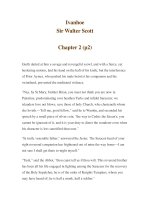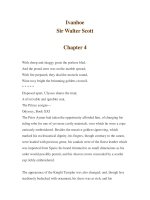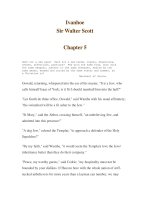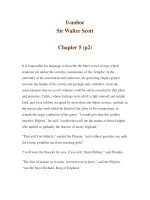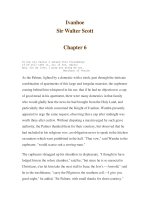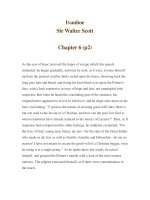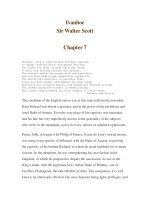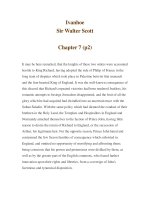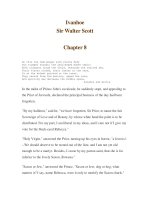Ivanhoe -Sir Walter Scott- Chapter 40 pps
Bạn đang xem bản rút gọn của tài liệu. Xem và tải ngay bản đầy đủ của tài liệu tại đây (24.88 KB, 9 trang )
Ivanhoe
Sir Walter Scott
Chapter 40
Shadows avaunt! Richard's himself again.
Richard III
When the Black Knight for it becomes necessary to resume the train of his
adventures left the Trysting-tree of the generous Outlaw, he held his way
straight to a neighbouring religious house, of small extent and revenue,
called the Priory of Saint Botolph, to which the wounded Ivanhoe had been
removed when the castle was taken, under the guidance of the faithful Gurth,
and the magnanimous Wamba. It is unnecessary at present to mention what
took place in the interim betwixt Wilfred and his deliverer; suffice it to say,
that after long and grave communication, messengers were dispatched by the
Prior in several directions, and that on the succeeding morning the Black
Knight was about to set forth on his journey, accompanied by the jester
Wamba, who attended as his guide.
"We will meet," he said to Ivanhoe, "at Coningsburgh, the castle of the
deceased Athelstane, since there thy father Cedric holds the funeral feast for
his noble relation. I would see your Saxon kindred together, Sir Wilfred, and
become better acquainted with them than heretofore. Thou also wilt meet
me; and it shall be my task to reconcile thee to thy father."
So saying, he took an affectionate farewell of Ivanhoe, who expressed an
anxious desire to attend upon his deliverer. But the Black Knight would not
listen to the proposal.
"Rest this day; thou wilt have scarce strength enough to travel on the next. I
will have no guide with me but honest Wamba, who can play priest or fool
as I shall be most in the humour."
"And I," said Wamba, "will attend you with all my heart. I would fain see
the feasting at the funeral of Athelstane; for, if it be not full and frequent, he
will rise from the dead to rebuke cook, sewer, and cupbearer; and that were a
sight worth seeing. Always, Sir Knight, I will trust your valour with making
my excuse to my master Cedric, in case mine own wit should fail."
"And how should my poor valour succeed, Sir Jester, when thy ight wit
halts? resolve me that."
"Wit, Sir Knight," replied the Jester, "may do much. He is a quick,
apprehensive knave, who sees his neighbours blind side, and knows how to
keep the lee-gage when his passions are blowing high. But valour is a sturdy
fellow, that makes all split. He rows against both wind and tide, and makes
way notwithstanding; and, therefore, good Sir Knight, while I take
advantage of the fair weather in our noble master's temper, I will expect you
to bestir yourself when it grows rough."
"Sir Knight of the Fetterlock, since it is your pleasure so to be
distinguished," said Ivanhoe, "I fear me you have chosen a talkative and a
troublesome fool to be your guide. But he knows every path and alley in the
woods as well as e'er a hunter who frequents them; and the poor knave, as
thou hast partly seen, is as faithful as steel."
"Nay," said the Knight, "an he have the gift of showing my road, I shall not
grumble with him that he desires to make it pleasant. Fare thee well, kind
Wilfred I charge thee not to attempt to travel till to-morrow at earliest."
So saying, he extended his hand to Ivanhoe, who pressed it to his lips, took
leave of the Prior, mounted his horse, and departed, with Wamba for his
companion. Ivanhoe followed them with his eyes, until they were lost in the
shades of the surrounding forest, and then returned into the convent.
But shortly after matin-song, he requested to see the Prior. The old man
came in haste, and enquired anxiously after the state of his health.
"It is better," he said, "than my fondest hope could have anticipated; either
my wound has been slighter than the effusion of blood led me to suppose, or
this balsam hath wrought a wonderful cure upon it. I feel already as if I
could bear my corslet; and so much the better, for thoughts pass in my mind
which render me unwilling to remain here longer in inactivity."
"Now, the saints forbid," said the Prior, "that the son of the Saxon Cedric
should leave our convent ere his wounds were healed! It were shame to our
profession were we to suffer it."
"Nor would I desire to leave your hospitable roof, venerable father," said
Ivanhoe, "did I not feel myself able to endure the journey, and compelled to
undertake it."
"And what can have urged you to so sudden a departure?" said the Prior.
"Have you never, holy father," answered the Knight, "felt an apprehension
of approaching evil, for which you in vain attempted to assign a cause?
Have you never found your mind darkened, like the sunny landscape, by the
sudden cloud, which augurs a coming tempest? And thinkest thou not that
such impulses are deserving of attention, as being the hints of our guardian
spirits, that danger is impending?"
"I may not deny," said the Prior, crossing himself, "that such things have
been, and have been of Heaven; but then such communications have had a
visibly useful scope and tendency. But thou, wounded as thou art, what
avails it thou shouldst follow the steps of him whom thou couldst not aid,
were he to be assaulted?"
"Prior," said Ivanhoe, "thou dost mistake I am stout enough to exchange
buffets with any who will challenge me to such a traffic But were it
otherwise, may I not aid him were he in danger, by other means than by
force of arms? It is but too well known that the Saxons love not the Norman
race, and who knows what may be the issue, if he break in upon them when
their hearts are irritated by the death of Athelstane, and their heads heated by
the carousal in which they will indulge themselves? I hold his entrance
among them at such a moment most perilous, and I am resolved to share or
avert the danger; which, that I may the better do, I would crave of thee the
use of some palfrey whose pace may be softer than that of my 'destrier'."*
* "Destrier" war-horse.
"Surely," said the worthy churchman; "you shall have mine own ambling
jennet, and I would it ambled as easy for your sake as that of the Abbot of
Saint Albans. Yet this will I say for Malkin, for so I call her, that unless you
were to borrow a ride on the juggler's steed that paces a hornpipe amongst
the eggs, you could not go a journey on a creature so gentle and smooth-
paced. I have composed many a homily on her back, to the edification of my
brethren of the convent, and many poor Christian souls."
"I pray you, reverend father," said Ivanhoe, "let Malkin be got ready
instantly, and bid Gurth attend me with mine arms."
"Nay, but fair sir," said the Prior, "I pray you to remember that Malkin hath
as little skill in arms as her master, and that I warrant not her enduring the
sight or weight of your full panoply. O, Malkin, I promise you, is a beast of
judgment, and will contend against any undue weight I did but borrow the
'Fructus Temporum' from the priest of Saint Bees, and I promise you she
would not stir from the gate until I had exchanged the huge volume for my
little breviary."
"Trust me, holy father," said Ivanhoe, "I will not distress her with too much
weight; and if she calls a combat with me, it is odds but she has the worst."
This reply was made while Gurth was buckling on the Knight's heels a pair
of large gilded spurs, capable of convincing any restive horse that his best
safety lay in being conformable to the will of his rider.
The deep and sharp rowels with which Ivanhoe's heels were now armed,
began to make the worthy Prior repent of his courtesy, and ejaculate, "Nay,
but fair sir, now I bethink me, my Malkin abideth not the spur Better it
were that you tarry for the mare of our manciple down at the Grange, which
may be had in little more than an hour, and cannot but be tractable, in
respect that she draweth much of our winter fire-wood, and eateth no corn."
"I thank you, reverend father, but will abide by your first offer, as I see
Malkin is already led forth to the gate. Gurth shall carry mine armour; and
for the rest, rely on it, that as I will not overload Malkin's back, she shall not
overcome my patience. And now, farewell!"
Ivanhoe now descended the stairs more hastily and easily than his wound
promised, and threw himself upon the jennet, eager to escape the
importunity of the Prior, who stuck as closely to his side as his age and
fatness would permit, now singing the praises of Malkin, now
recommending cautionto the Knight in managing her.
"She is at the most dangerous period for maidens as well as mares," said the
old man, laughing at his own jest, "being barely in her fifteenth year."
Ivanhoe, who had other web to weave than to stand canvassing a palfrey's
paces with its owner, lent but a deaf ear to the Prior's grave advices and
facetious jests, and having leapt on his mare, and commanded his squire (for
such Gurth now called himself) to keep close by his side, he followed the
track of the Black Knight into the forest, while the Prior stood at the gate of
the convent looking after him, and ejaculating, "Saint Mary! how prompt
and fiery be these men of war! I would I had not trusted Malkin to his
keeping, for, crippled as I am with the cold rheum, I am undone if aught but
good befalls her. And yet," said he, recollecting himself, "as I would not
spare my own old and disabled limbs in the good cause of Old England, so
Malkin must e'en run her hazard on the same venture; and it may be they
will think our poor house worthy of some munificent guerdon or, it may
be, they will send the old Prior a pacing nag. And if they do none of these, as
great men will forget little men's service, truly I shall hold me well repaid in
having done that which is right. And it is now well-nigh the fitting time to
summon the brethren to breakfast in the refectory Ah! I doubt they obey
that call more cheerily than the bells for primes and matins."
So the Prior of Saint Botolph's hobbled back again into the refectory, to
preside over the stockfish and ale, which was just serving out for the friars'
breakfast. Pursy and important, he sat him down at the table, and many a
dark word he threw out, of benefits to be expected to the convent, and high
deeds of service done by himself, which, at another season, would have
attracted observation. But as the stockfish was highly salted, and the ale
reasonably powerful, the jaws of the brethren were too anxiously employed
to admit of their making much use of their ears; nor do we read of any of the
fraternity, who was tempted to speculate upon the mysterious hints of their
Superior, except Father Diggory, who was severely afflicted by the
toothache, so that he could only eat on one side of his jaws.
In the meantime, the Black Champion and his guide were pacing at their
leisure through the recesses of the forest; the good Knight whiles humming
to himself the lay of some enamoured troubadour, sometimes encouraging
by questions the prating disposition of his attendant, so that their dialogue
formed a whimsical mixture of song and jest, of which we would fain give
our readers some idea. You are then to imagine this Knight, such as we have
already described him, strong of person, tall, broad-shouldered, and large of
bone, mounted on his mighty black charger, which seemed made on purpose
to bear his weight, so easily he paced forward under it, having the visor of
his helmet raised, in order to admit freedom of breath, yet keeping the
beaver, or under part, closed, so that his features could be but imperfectly
distinguished. But his ruddy embrowned cheek-bones could be plainly seen,
and the large and bright blue eyes, that flashed from under the dark shade of
the raised visor; and the whole gesture and look of the champion expressed
careless gaiety and fearless confidence a mind which was unapt to
apprehend danger, and prompt to defy it when most imminent yet with
whom danger was a familiar thought, as with one whose trade was war and
adventure.
The Jester wore his usual fantastic habit, but late accidents had led him to
adopt a good cutting falchion, instead of his wooden sword, with a targe to
match it; of both which weapons he had, notwithstanding his profession,
shown himself a skilful master during the storming of Torquilstone. Indeed,
the infirmity of Wamba's brain consisted chiefly in a kind of impatient
irritability, which suffered him not long to remain quiet in any posture, or
adhere to any certain train of ideas, although he was for a few minutes alert
enough in performing any immediate task, or in apprehending any
immediate topic. On horseback, therefore, he was perpetually swinging
himself backwards and forwards, now on the horse's ears, then anon on the
very rump of the animal,
now hanging both his legs on one side, and now sitting with his face to the
tail, moping, mowing, and making a thousand apish gestures, until his
palfrey took his freaks so much to heart, as fairly to lay him at his length on
the green grass an incident which greatly amused the Knight, but
compelled his companion to ride more steadily thereafter.

